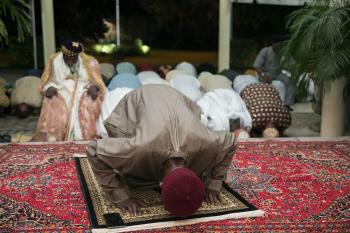2025 Muslim Ministry Network
- Image

Europe has had to respond to Islam since the latter’s inception. Today, Europe is dealing with Islam and Muslims on its own turf. According to Pew Research, “Europe's Muslim population is projected to exceed 58 million by 2030. Muslims today account for about 6% of Europe's total population” (January 27, 2011, The Future of The Global Muslim Population).
Muslims have a strong sense of identity. According to Huntington, author of Clash of Civilizations, religious identities will be the root cause of future wars. Indeed, they have been the root cause of many wars already. But as Christians, we believe that this clash/conflict is spiritual at its core. As such, the approach to resolving this conflict must be spiritual. True peace will only be attained when the Messiah, the Prince of Peace, changes the hearts of both Muslims and Europeans. Until then, the clash will continue.
We praise God for the fruitful and much-appreciated labour of individual European Christians. But we could do better. At the moment, European witness to Muslims is fractured and patchy. The European Evangelical church needs to develop an effective and coordinated outreach strategy that trains church members in a way which multiplies their ministry among refugees and immigrants. There is also a need for practical outreach and discipleship tools in their native languages.
The Muslim Ministry Network’s vision is to:
- Teach with content, means, and styles of sharing the Gospel with Muslims
- Equip in practical training and support for European leaders engaged in ministry to Muslims
- Encourage to participate in various opportunities related to Muslim outreach throughout Europe
- Connect leaders across diverse backgrounds and ministries to come together and discuss the most effective ways to engage with Muslims
- Resource leaders to train others in evangelising and discipling Muslims and Muslim background believers
What ELF Leaders Are Saying
- "Being here is helpful for me because I have gotten training in apologetics, which is very much helpful in my context where we deal increasingly more with Muslims. I have also been able to get much-needed resources that I can take home to encourage and train others."
- Matej Bela, Theology Student, Slovenia - "The seminars at the Forum on ministry among Muslims are especially timely in my country. The insights from the Network sessions at ELF strengthen my teaching work among future pastors and strengthen my apologetic skills."
- Andras Pataki, Pastor, Hungary
The Muslim Ministry Network seeks to teach, equip, and resource those engaged in Muslim ministry or those desiring to learn more about Muslim outreach, helping to bridge the gap between evangelism and discipleship among Muslims and Muslim background believers.
Network Leadership
Network Speakers
Fari Boosheri is the Leader of Iranian Christian Outreach in Swansea, Wales, reaching out to Muslims, particularly Iranians, and refugees with the Good News of our Lord Jesus Christ. As a Muslim, Fari was saved by God's Grace, and all he wanted was to reach out to his own people from Muslim… Read more
Dr. Femi Cakolli, a native of Kosovo, embraced Christianity in 1992 while studying literature. Coming from a Muslim background, he planted his first church in 1994 and has since continued church-planting efforts. Today, he leads the Dardania Church Network in Kosovo. In 1997, he founded the… Read more
Kenneth Kühn has been serving as Area Director for Europe in Elam Ministries since March 2016. He was brought up in a pastor’s home in Denmark, serving in teenage ministry and Student Missions. He started his full-time ministry at the age of twenty, pioneering a youth work that… Read more
Beth Peltola is an author and teacher on Biblically understanding Islam, its history, expansion, and Christian mission. She was born and educated in Southern Africa, moved to the UK for secondary education, and attended Bible college in America to pursue a degree in Biblical studies. At 22 years… Read more
Emil Shehadeh was born in Israel and educated mainly in the UK, achieving BSc Hons (Medical Biology), MSc (Biochemistry), MB ChB (Medicine), and a Diploma in Dermatology and MRCGP, as well as a DPGT and PhD in Islamic studies. Growing up in Israel, he accompanied his parents all over Galilee,… Read more
Network Programme
Sunday, 18 May
Conversion is a process. It begins with an encounter, leading to contemplation, during which pulling and pushing factors are at play. What are these encounters and factors like? In this session, we will explore what Muslim Background Christians teach us about this journey, and how it informs our approach to evangelism.
A typical Muslim believes that they have the final and true revelation of God. The Jews had the revelation to Moses, the Christians had the revelation to Jesus, but only Muslims have the complete revelation of God. Muhammad is the last or the “seal” of all the prophets. Allah is not a Triune God and the Islamic confession of faith declares the uniqueness of Allah, and rejects the deity of Christ and of the Holy Spirit. And yet, many Christians today do not know how to explain their faith to Muslims and address these questions or refute Muslim’s attacks against basic Christian doctrines.
Monday, 19 May
Whereas Christians have one Scripture (the Bible), Muslims have at least four scriptures: The Qur’an, hadith, Sirah and Tafsir. In this session, we will describe each of the four and explain how they are ranked, how they are interlaced, and why Muslims need all of them. Supposedly, the Qur’an is the most sacred of the four, but is it really? Are the other three really subservient to the Qur’an?
Muslims claim that the current Qur’an is identical to a copy on a tablet kept in heaven. Is this claim supported by internal evidence? If so, why do we have so many versions of the Qur’an? Why have there been at least four recensions of the Qur’an? This session will answer these questions and more as we evaluate the authenticity of Islam’s holy book and how it should shape our apologetics.
Tuesday, 20 May
Muslims are coming to Christ in greater numbers than ever. As we seek to participate in God’s move in our region, we’ve particularly noticed three areas of profound impact that we will cover in this session: the Word of God in the hands of seekers, the courage of believers in the face of intense pressure, the impact of transformed lives as witness.
The Holy Trinity is one of the most problematic Christian doctrines for Muslims to accept. We will have three experts share with us how they would personally explain the Holy Trinity to a Muslim. They will cover the "Verbatim Criterion" (what the Qur’an says about the nature of Jesus) and the "Goose and Gander Criterion" (can Muslims make the same allowances for Christianity as they make for Islam).
Wednesday, 21 May
As a devout Muslim, the last thing Fari expected was to become a follower of Jesus. However, the Lord had other plans. In this session, Fari will share his personal testimony of how he was saved by God’s grace and led to start the Iranian Christian Outreach, which began as a small prayer group in 1995 and now has hundreds of worshippers of Christ from Muslim backgrounds.
In recent years, huge numbers of Iranians have been turning away from their national religion to embrace faith in Christ. It is happening to such a vast extent that today the church in Iran is deemed to be one of the fastest-growing in the world. This growth - which is happening in the face of harsh persecution from Iran’s government - can only be sustained through effective disciple-making ministry. In this panel discussion, we will learn some principles and tools of how to start a sustainable discipleship movement among Muslim-background converts.




